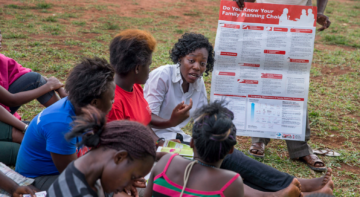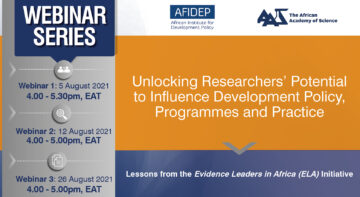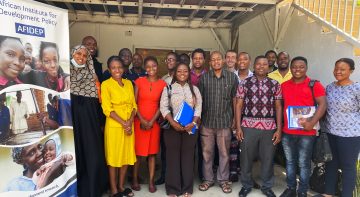Blogs

Today, on International Day of Women and Girls in Science, I am reflecting on my journey and some of the challenges faced by early-career woman researchers.
The bigger picture: Contributing to knowledge
In a recent staff training on scientific writing, African Institute for Development Policy (AFIDEP) Director of Development Policy, Professor Nyovani Madise, asked staff why publishing in scientific journals was important. Most answers that staff gave were related to improving personal or institutional reputations – demonstrating the research capabilities of an institution, “getting your name out there,” legitimising research activities through the rigorous peer review process, etc.
Prof Madise paused and listened to each of our answers. She then noted that we had forgotten the most important reason to publish: to contribute to knowledge.
One way to work towards publishing in scientific journals and ultimately contribute to knowledge is by participating in relevant scientific conferences. This involves submitting abstracts from your work for selection as either oral or poster presentations. If selected to participate, it is a great platform to get feedback from experienced peers, hone your skills and polish your work, thus increasing chances of being published later on.
One way to work towards publishing in scientific journals and contribute to knowledge is by participating in relevant scientific conferences. That is submitting abstracts from your work for selection for oral or poster presentations. Share on XLimiting beliefs
I am an early-career researcher. I have worked in research spaces for much of my career, but publishing and submitting abstracts to conferences always seemed daunting or out of reach for me. Academia is still very male-dominated and hierarchical. Despite progress in recent years, women in academia are less likely to be hired, promoted, or earn as much money as male peers in universities. Even in fields such as global health that have a majority female workforce, leadership positions are often dominated by men – while 70% of the global health workforce is female, only 25% of the leadership positions are occupied by women. Perhaps as a result of this, I never felt that what I was working on was important enough that others would be interested in it.
Moreover, I didn’t know where to start – which conferences and journals to submit to, whether presenting posters was a good use of time, even who to include as an author and in what order. There is a lot of assumed knowledge that is unrelated to research methods.
The importance of female mentorship
Fortunately for me, I had the encouragement, mentorship and support of my colleagues at AFIDEP, including from Prof Madise and other colleagues (both female and male). The importance of female mentorship has been noted, particularly in fields
I manage two research projects at AFIDEP, one qualitative study on antimicrobial resistance (AMR) control policy in Malawi and one mixed-methods study on drivers of and solutions to teenage pregnancy among girls in school in Malawi. AMR and teenage pregnancy are both issues of great concern to policymakers in Malawi and the region, and our findings needed to be disseminated – we needed to contribute to knowledge.
Taking action: Five tips for early-career researchers
In a short time span, I submitted three abstracts – one on findings from our AMR policy study to the University of Malawi College of Medicine Research Dissemination Conference, and two on findings from our study on teen pregnancy in Malawi. The first was accepted as an oral presentation, and the others were accepted as posters. I was very fortunate to be able to source funding to attend both, which otherwise would have been a barrier to attendance for me.
After attending two conferences in three weeks, here is my advice to early career researchers:
- Submit abstracts
Most abstracts are relatively short (150-500) words, and in most cases, you do not have to have already written a paper or completed data analysis. Reviewers lookout for relevance to the conference theme, a clear topic, a credible methodology, and a brief summary of findings. Submitting an abstract costs you nothing, and if you are already conducting research, the abstract will write itself.
- Apply for travel funding
Be sure to check for opportunities to apply for travel funding. Many international conferences have opportunities for people based in low-income countries. I missed out on an opportunity to attend a high-level conference recently because I missed the deadline to apply for a travel grant.
- Get feedback from colleagues
Get feedback on your slides or posters from people who have presented at conferences before. I had never designed a poster before, so I remember running around the office getting samples of posters from my colleagues. Practice giving your presentation to an audience and ask them to ask questions/give you feedback as though you were at a conference, and practice multiple times.
- Attend local conferences
The University of Malawi College of Medicine Research Dissemination Conference was an opportunity to deep dive on health issues of importance in Malawi. After my presentation, I met a number of people working on AMR and health policy research in Malawi. I also was approached by policymakers working on AMR and later was invited to give my presentation again at an AMR policy working group.
- Present posters
Having your abstract accepted as a poster presentation may not be considered as high profile as an oral presentation, however, I found presenting posters at the Union of African Population Studies 8th African Population Conference to be an extremely valuable experience. I gained experience presenting my findings and fielding questions, and a sense of what people found most interesting about my findings. I met other researchers at various stages in their careers working on teen pregnancy and sexual and reproductive health in other settings, and had rich discussions about similarities and differences, as well as policy solutions.
The bottom line
Your research is important, and you miss 100% of the chances you don’t take. On International Day of Women and Girls in Science, I encourage early-career woman researchers to submit abstracts, seek feedback, and attend conferences if possible. I encourage male academics and researchers to support their female colleagues. Though presenting and publishing is not the only thing to think about as an early-career researcher, it’s one important way to contribute to knowledge and break down barriers.
Related Posts





